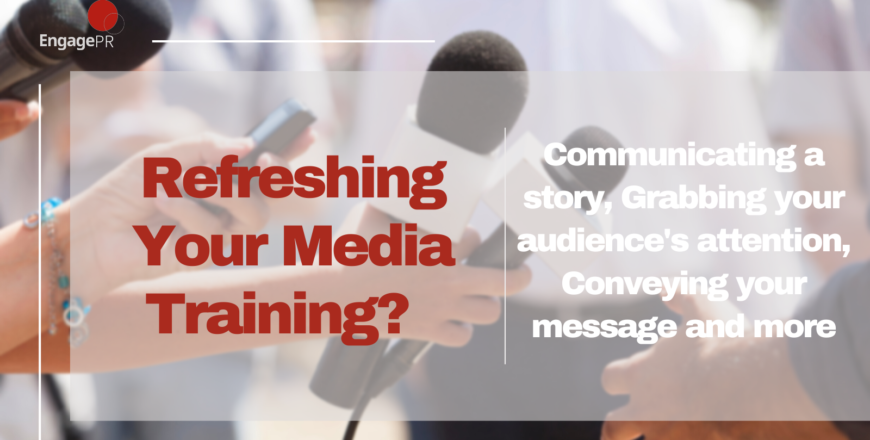
Trade shows and in-person meetings are finally back, including face-to-face opportunities with reporters and industry analysts. A new chapter of interaction means a good time to refresh our communications skills, especially in the context of media training. I blogged about the importance of media training a few years ago. However, no matter the world’s changes, the advice then is as valuable now as ever.
A good PR practitioner will stimulate a reporter’s interest in a conversation with the client. Still, our client’s interview performance can make or break how and if the client gets coverage.
Speaking with a journalist differs from speaking with board members, colleagues, and clients. An interview is not a conversation but rather a transaction. The journalist wants information, and you want to provide specific messages succinctly that convey your company’s point of view.
Carefully crafted media training conducted by an experienced PR practitioner can provide company spokespeople with the skills needed to navigate through the potential landmines of an interview. With so many content channels, media training is essential. Whether the coverage is published in print media or broadcast, these strategies help clients optimize conversations with the media for the best content possible.
Here are the top tips for media preparation to make the most of any press interview.
Communicate a Story
While some media focuses on hard news, they are ultimately trying to connect the relevance of your company’s news to a broader, unique story that sparks your customer’s interest. How can company spokespeople become skilled storytellers? First, read and understand your journalist’s favored subject matter; every journalist and media outlet is different. Next, consider the publication’s audience; does your product solve a problem for the engineers reading the publication? Is the content geared towards executives looking for a competitive edge? Convey emotion, lend relatable examples and anecdotes, and provide quotable soundbites that will resonate with the reporter’s audience. Finally, come across as both knowledgeable and personable. During an interview, your demeanor is as important as your words.
Speaking to the media is a skill that must be developed and cultivated. It takes practice and practical application. The media landscape is continually changing, especially in social media, where the story changes by the minute, so refresher sessions are not only recommended but necessary.
Grab Your Audience’s Attention
Now that we’re back to face-to-face briefings, media training can teach you to captivate and connect with your listeners through body language and tone of voice. When doing interviews via video, tone of voice and concision are critical, especially when you only have 20 minutes or less to get the reporter’s interest. You don’t want them to just write about you. You want them to consider you as a resource for future stories. When you have that unique opportunity to meet a reporter face-to-face, remember that your body language, eye contact and posture can convey more than words. Media coaching that includes a practice video session can highlight your respective responses to positive and negative questions and help you prepare for any inquiry. An experienced PR professional can teach you the basics of how to speak and carry yourself during interviews and can help you get the attention you need for the message you want to share. After all, studies have shown that body language is considerably more important than what you say.
Convey Your Message Successfully
You should prepare a shortlist of key messages you want to get across for every interview. Going through media training can help you do this effectively and make it easier to captivate and retain your audience’s attention. Learning to address their needs and desires through key messages will give you an edge. A PR practitioner will teach you how to package your messages and insert them into as many of your responses as possible. That way, you will repeat your main ideas and ensure that they stick in people’s minds.
Be Prepared for Difficult Questions
If your company is involved in a controversy or problem, you can expect to be asked some difficult questions. A seasoned PR professional will help you anticipate those questions and provide some bullet points for answers. This will prevent long, unnecessarily contemplative pauses or regrettable, on-the-spot disclosures. Having an experienced PR team that can anticipate questions and provide suggested responses will help you avoid negative press – or even legal problems – down the road.
Provide Quotable Quotes
There’s nothing more upsetting than seeing a large feature piece about your company that includes a quote from you that doesn’t reflect any of your carefully prepared key messages. To avoid this problem, learn how to answer questions clearly so the media can easily formulate a quote that includes your key message. If you know how to answer media questions properly and thoroughly, you are more likely to be quoted correctly.
No matter your technical skills, key message conveyance to the media is a separate skill set developed through extensive preparation and practice. Media training is a useful tool to prepare company’s executives for success during their next reporter interview. Even for clients that have undergone media training, a refresher training course is equally valuable to get advice and tips on the evolving media landscape.
Interested in brushing up on your media skills through in-depth strategy and preparation? Contact us!